Late last month, Sonja Cameron from Cameron’s Nursery at Arcadia in New South Wales accepted the Nursery and Garden Industry NSW and ACT’s Environmental award. Sonja Cameron is no stranger to awards, she wins them consistently for her strong commitment to sustainability and she is happy to share her story with other growers and gardeners. Some 300 plus visitors come to the nursery each year to look at its sustainable infrastructure.
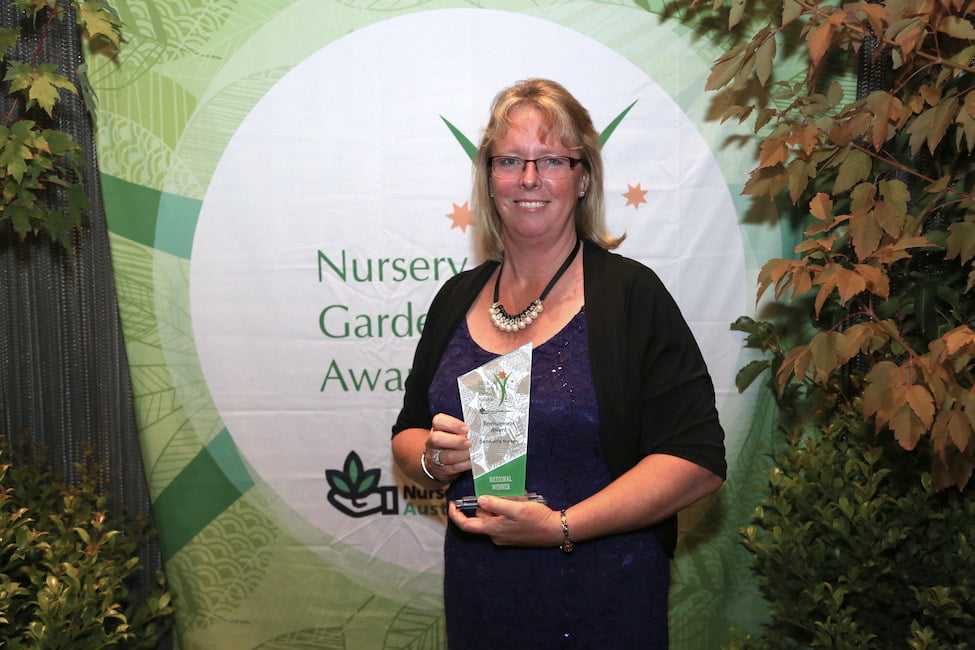
Sonja Cameron accepts the Nursery and Garden Industry NSW and ACT Environment Award 2016
Cameron’s is a specialist perennial wholesale nursery producing quality brands such as Australian Perennial Growers, Aussie Winners and Colourwave. They take care to make sure that their plants are grown sustainably.
Nursery background and planning
Cameron’s Nursery was established in 1992 by Sonja and Andy Cameron and has occupied the site at Arcadia in north-west Sydney for 16 years where Andy now also runs his nursery industry software business and consults.
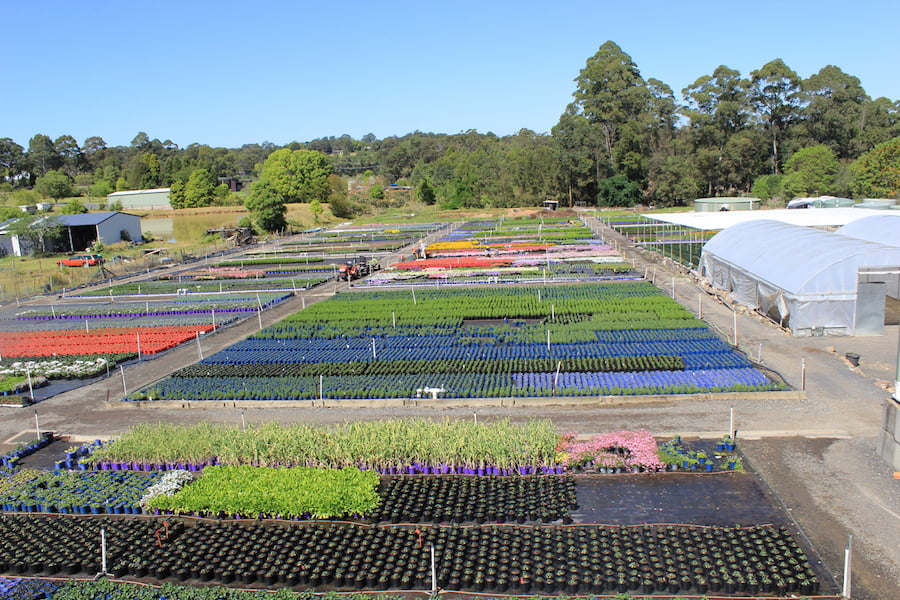
Cameron’s Nursery
Back in 1999 when they bought the 2.4 hectare site it was an old orchard. Sonja and Andy planned that the nursery site would be as sustainable as possible. They initially designed a water management plan which has become the basis for all the water onsite. Capillary beds were built to water pots from the ground up, concrete drains were laid to capture run off and direct it to storage and they put in other waterwise infrastructure. Says Sonja
“All our buildings have gutters so we can capture all water that falls on their roofs to use for irrigation”
She explains that taking steps to make the nursery as independent as possible from town water was done for both financial and sustainable reasons and is now bringing big savings.
The nursery now stores 340,000 litres of water in tanks and 500,000 litres in the dam, all captured on site. The health of the water is checked weekly following Nursery Industry Accreditation Scheme guidelines and the industry’s EcoHort regulations for water quality. Despite this substantial volume of water, some potable water is still needed, especially when the weather is hot and rainfall is scarce.
The concern with getting water usage right has paid huge dividends. Using old practices the nursery required 25ML per hectare, says Sonja. “Today by using capillary beds, covered drains and water holding tanks our water usage has dropped considerably.
“Water usage varies with climatic conditions but in 2010 it was down to 4ML. In 2012, a dry year, that figure was up to 7.9ML but it is still less than 25 per cent of what would have been used without our careful approach. Potable water use has also dropped dramatically, falling from 4.5ML in 2010 to 1.5ML in 2015 and with it considerable savings have flowed,” she explains.
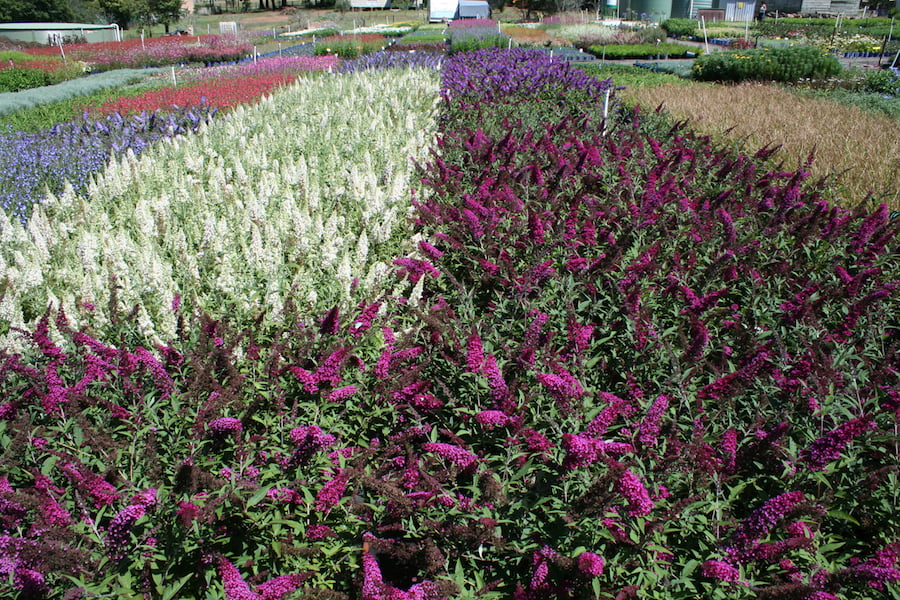
Cameron’s Nursery crop of Buddleia Buzz
Water treatment
As the nursery depends on recycled water for irrigation, it was important as part of the sustainable model to install a filtering system that cleaned water efficiently without the use of chemicals. This was achieved with a slow media filter, Clearwater cloth filter and a series of settlement and reed beds.
A series of settlement pits and reed beds cleans the recycled water before it reaches the main dam. This also assists in removing large items plus it extracts some nitrogen and phosphorus.
Another layer of water treatment was installed in the form of a Clearwater filtration unit and flocculation system.
Monitoring the environment
This year, extra layers of data are being collected from across the nursery from six environmental sensors. These record data from the dam, water storage tanks, individual pots and igloos. The sensors are monitoring weather conditions, light levels, leaf wetness, dissolved oxygen, soil and water temperature, and pH among other data. The data flows via a Wi-Fi network to the office computers and to individual smart phones.
“Having access to so much data from across the property even when we are off site has been revolutionary. It has enabled us to pick up on adverse conditions such as a recent pH spike, before any damage was done, and has given us a freedom we didn’t have before.”
“Going away from your business is difficult when you are dealing with a live product,” she explains. “By having access to data at our fingertips, we can make decisions and assess situations with confidence and now feel we can travel away without our plants suffering.”
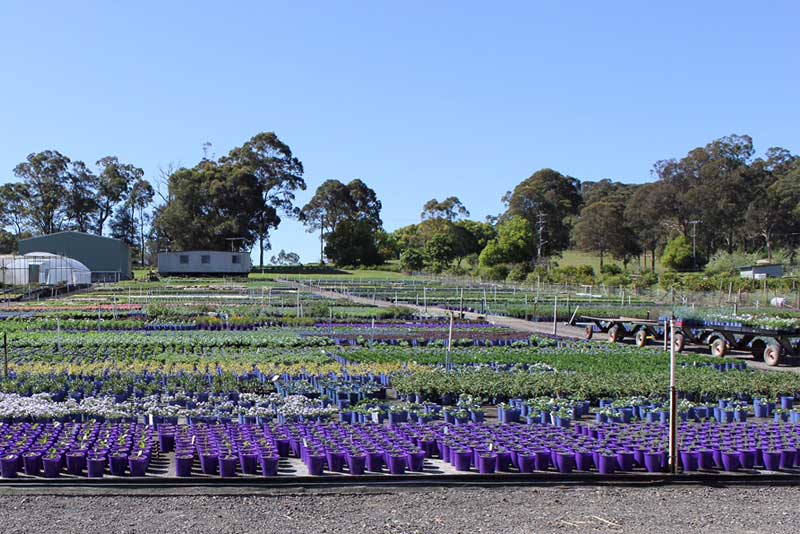
Cameron’s Nursery
Other recycling
As well as recycling all water on site, Cameron’s also has other sustainable strategies in place from recycling cardboard, paper and other materials to the composting of greenwaste both on site and through the local council recycling service. Electricity is used with care. Plugwise monitoring turns off lights and other electrical equipment when not in use.
Chemical usage for crop protection is high in most production nurseries. At Cameron’s chemical usage is reduced by selecting environmentally friendly options.
Despite the comprehensive programs already in place Sonja is constantly working towards greater efficiencies. This means reviewing current practices and assessing new options.
“Our sustainable policy gets review annually and incorporates all areas of our business from the office to what’s happening in the field and includes waste, water, energy, planning, purchasing, work practices and management of the entire site,” explains Sonja. “There is a green procurement policy for all purchases from equipment of office supplies and we are particularly interested in not just using recycled materials but considering how products we purchase can be recycled in the future.”
The business isn’t resting on its laurels however. Sonja says they are currently assessing their energy needs, particularly looking for more sustainable options for heating the igloos over winter. They have learnt an enormous amount and have had fabulous support from government departments, suppliers colleagues and importantly from their staff.
For those wanting to embark on their own sustainable journey she says the three critical items to explore are water, waste and power and she advises getting everyone onboard. Says Sonja
“Our sustainability focus relies on the commitment of everyone. While we are implementing efficient and sustainable practices, it is the commitment of our staff that truly make a difference in delivering environmental benefits. Everyone has a part to play in our journey.”
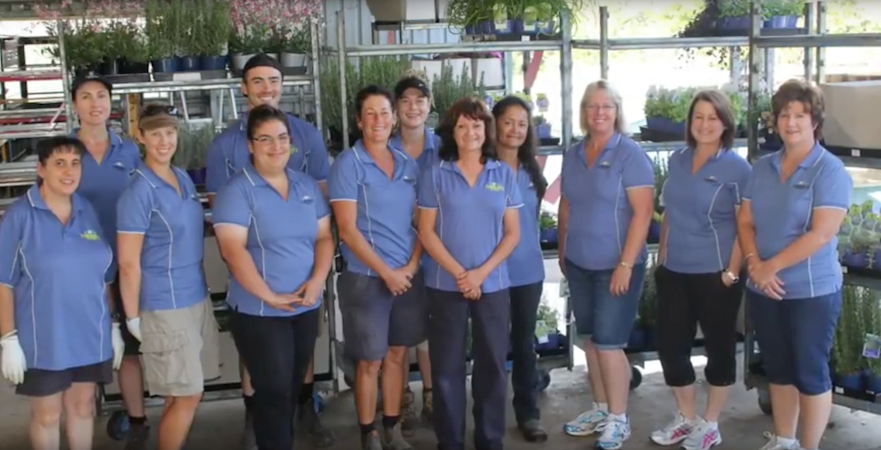
The staff at Cameron’s Nursery are committed to the company’s sustainability goals
Awards a plenty
The Camerons have been recognised for their commitment to the environment, water saving solutions and their business acumen. Here’s a sample of their recent awards.
2016 Nursery and Garden Industry NSW and ACT Environmental Award
2015 Nursery and Garden Industry Australia Environment Award
2014 Nursery and Garden Industry of NSW and ACT (NGINA) Environmental Award; United National World Environment Day Awards Category Winner; Businesswomen’s Hall of Fame (Sonja Cameron); Finalist in the Nursery and Garden Industry Association Best Small Production Nursery 2014
2013 United National World Environment Day Award; Local Woman of the Year for the Hawkesbury (Sonja Cameron), NGINA Environmental Award.
2012 Australian Save Water Award; Finalist in the Prime Minister’s Award for Saving Potable Water
2011 NSW Green Globe Award for Water Saving Award
